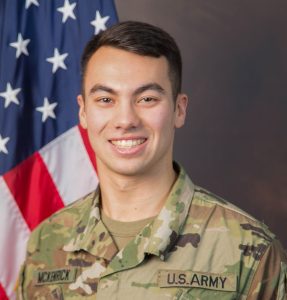
Meet Cadet Brian McKenrick, the Combating Terrorism Center’s Cadet of the Month for May 2021:
Tell us a little bit about yourself.
My name is Brian McKenrick, and I am a firstie here at West Point. I am a Law and Legal Studies major and have been a Terrorism Studies minor, with a focus in counterterrorism, since my plebe year. One of my favorite memories of my West Point career was my AIAD, through the NATO Cooperative Cyber Defense Center of Excellence and the Army Cyber Institute, to Estonia, Poland, and Germany to learn about cyber policy, tactics, and law. This spurred an interest in cyber law and warfare, and I just completed my thesis titled Empowering the U.S. Government and Its Corporations Against Foreign Cyber Operations. I am currently the platoon leader of Joker Platoon in Company H2 (Happy as Hell!). I was on the Swim Team for three years here and hold a few Academy records. In my free time, I love to workout, play piano, make coffees and teas, and cook. I also love to read non-fiction and learn new things about any topic from woodworking to business practices, just nothing related to math!
What does the Terrorism Studies Minor mean to you?
At first, the Terrorism Studies minor meant integrating more military, political, and cultural ideas to my law studies. But since my interest in cyber law and warfare was spurred, it has become apparent that the blurring between state and non-state actors is intensifying. Now the Terrorism Studies minor means learning how to operate in this area of the law and the global political state. Many people see this blurring as unfortunate and a detriment to international relations and the rule of law. The Terrorism Studies minor has taught me to think in different ways and even understand this blurring of lines as advantageous to the U.S. and its military operations.
Additionally, the minor itself has allowed me to branch out from the Law and the Social Sciences departments and take classes in the Department of Military Instruction. Learning from academics in the Combating Terrorism Center, lawyers in the Law Department, and even special forces commanders and operators in the Department of Military Instruction has contributed greatly to my academic development—not to mention the plethora of special guests, from Lieutenant General Rolando Joselito Bautista, commander of the Philippine forces during the Battle of Marawi against ISIS, to former acting U.S. Secretary of Homeland Security Kevin McAleenan. My interactions with all of these individuals—their stories, their lessons learned—greatly expanded my understanding of the U.S., the Army, and most importantly my role in all of this.
What does the Combating Terrorism Center mean to you?
The free exchange and development of all ideas, in a non-judgmental place, while working to convey these ideas in a format whether written, oral, or digital, is what the Combating Terrorism Center has meant to me. Coming to my minor classes and telling the instructor, “Well, from a legal perspective, it doesn’t make any sense for a terrorist organization to do this,” and then immediately being told, “Well, terrorist organizations don’t follow international law to begin with,” and having a back-and-forth discussion, with a willingness on both ends to learn more, is the pinnacle of a good education and discussion. The faculty at the Combating Terrorism Center show this care in every conversation, interaction, and class I have ever had. Their insistence for academic rigor in studying such a complex problem set, while also holding a humble, caring, and interactive stance with outside members is why the Combating Terrorism Center is so amazing.
What are your career and professional goals?
In December of 2020, I branched Military Intelligence with an Armor detail. I hope to be a scout platoon leader before I enter my Military Intelligence time. I eventually hope to get my law degree and work in the application, study, and/or teaching of the law of armed conflict, especially as it applies to national security and cyberspace.
 Skip to content
Skip to content
